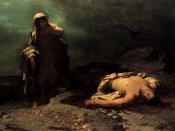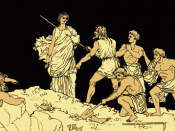Chorus: made up of about 15 elders of Thebes, 15 people who chant narrative odes
Choragos: leader of the chorus
Parados: first ode, or choral song in a greek tragedy changed by the chorus as it enters
the area in front of the stage
Ode: each scene is followed by an ode. These odes served both to seperate one scence
from the next and also to provide the chorus's response to the previous scene, interlude in
greek drama
Strophe: part of the ode that the chorus chants as it moves from right to left across the
stage
Antistrophe: part of the ode chant as the chorus moves back across the stage from left to
right
Exodos: the final or exit scene
Drama: a story that is written to be acted for an audience
major elements of dramatic plot are: exposition, complications, climax, and resolution
Tragedy: play, novel, or other narrative depicting serious and important events, in which
the main character comes to an unhappy end
Tragic Hero/Heroine: hero neither good nor bad, highly renowned and prosperous
Tragic Flaw: a character weakness, or by forces beyond the character's control
Catharsis: emotional porging, emotional release following tragedy
Dramatic Irony: audience knows something characters don't
Verbal: speaker means one thing but means another
Situational: what happens is opposite of what is expected
Poetic Techniques
Metaphor: figure of speech that makes a comparison between 2 unlike thing without
using like,as
Simile: figure of speech that makes a comparison between 2 seemingly unlike things with
conective word
Imagery: language that appeals to the senses
Antigone is opposed to her radiant sister .
Unlike her beautiful and docile sister, Antigone
is scrawny, sallow, withdrawn, and recalcitrant brat.
The Chorus recounts the events leading to Antigone's tragedy. Oedipus, Antigone and
Ismene's father, had two sons, Eteocles...


